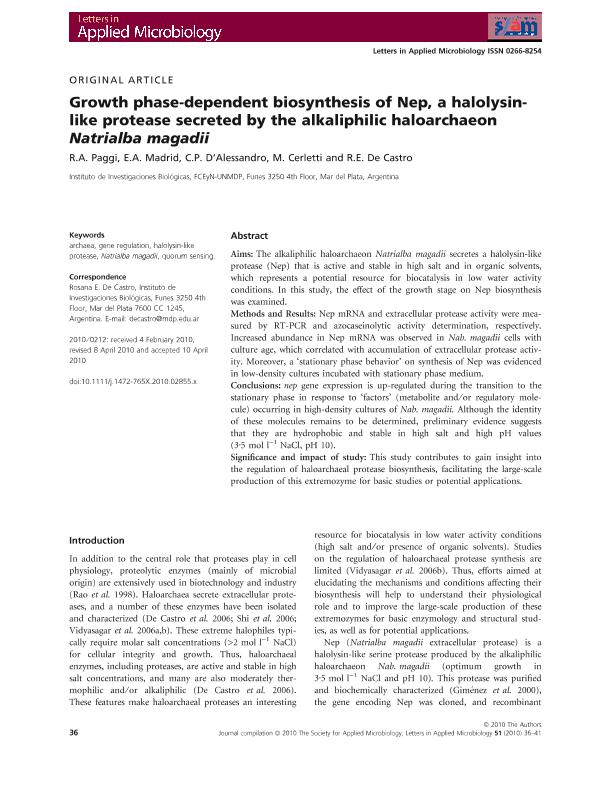Artículo
Growth phase-dependent biosynthesis of Nep, a halolysinlike protease secreted by the alkaliphilic haloarchaeon Natrialba magadii
Paggi, Roberto Alejandro; Madrid, Enrique Alberto; D'alessandro, Celeste Paola ; de Castro, Rosana Esther
; de Castro, Rosana Esther
 ; de Castro, Rosana Esther
; de Castro, Rosana Esther
Fecha de publicación:
09/06/2010
Editorial:
Wiley Blackwell Publishing, Inc
Revista:
Letters in Applied Microbiology
ISSN:
0266-8254
Idioma:
Inglés
Tipo de recurso:
Artículo publicado
Clasificación temática:
Resumen
Aims: The alkaliphilic haloarchaeon Natrialba magadii secretes a halolysin-like
protease (Nep) that is active and stable in high salt and in organic solvents,
which represents a potential resource for biocatalysis in low water activity
conditions. In this study, the effect of the growth stage on Nep biosynthesis
was examined.
Methods and Results: Nep mRNA and extracellular protease activity were measured by RT-PCR and azocaseinolytic activity determination, respectively.
Increased abundance in Nep mRNA was observed in Nab. magadii cells with
culture age, which correlated with accumulation of extracellular protease activity. Moreover, a ‘stationary phase behavior’ on synthesis of Nep was evidenced
in low-density cultures incubated with stationary phase medium.
Conclusions: nep gene expression is up-regulated during the transition to the
stationary phase in response to "factors" (metabolite and ⁄ or regulatory molecule) occurring in high-density cultures of Nab. magadii. Although the identity
of these molecules remains to be determined, preliminary evidence suggests
that they are hydrophobic and stable in high salt and high pH values
(3Æ5 mol l)1 NaCl, pH 10).
Significance and impact of study: This study contributes to gain insight into
the regulation of haloarchaeal protease biosynthesis, facilitating the large-scale
production of this extremozyme for basic studies or potential applications.
Palabras clave:
NATRIALBA MAGADII
,
ARCHAEA
,
HALOLYSIN-LIKE PROTEASE
,
GENE REGULATION
Archivos asociados
Licencia
Identificadores
Colecciones
Articulos(CEPAVE)
Articulos de CENTRO DE EST.PARASITOL.Y DE VECTORES (I)
Articulos de CENTRO DE EST.PARASITOL.Y DE VECTORES (I)
Articulos(IIB)
Articulos de INSTITUTO DE INVESTIGACIONES BIOLOGICAS
Articulos de INSTITUTO DE INVESTIGACIONES BIOLOGICAS
Citación
Paggi, Roberto Alejandro; Madrid, Enrique Alberto; D'alessandro, Celeste Paola; de Castro, Rosana Esther; Growth phase-dependent biosynthesis of Nep, a halolysinlike protease secreted by the alkaliphilic haloarchaeon Natrialba magadii; Wiley Blackwell Publishing, Inc; Letters in Applied Microbiology; 51; 9-6-2010; 36-41
Compartir
Altmétricas



